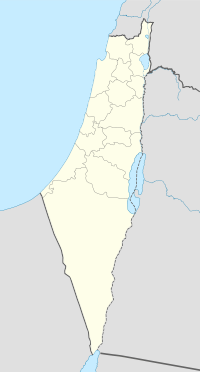Dayr al-Hawa
| Dayr al-Hawa | |
|---|---|
| Arabic | دير الهوا |
| Name meaning | The Monastery of the Wind |
| Subdistrict | Jerusalem |
| Coordinates | 31°45′05″N 35°02′14″E / 31.75139°N 35.03722°ECoordinates: 31°45′05″N 35°02′14″E / 31.75139°N 35.03722°E |
| Palestine grid | 153/128 |
| Population | 60 (1945) |
| Area | 5,907 dunams |
| Date of depopulation | October 19–20, 1948 |
| Cause(s) of depopulation | Military assault by Yishuv forces |
| Current localities | Nes Harim |
Dayr al-Hawa (Arabic: دير الهوا) was a Palestinian Arab village in the Jerusalem Subdistrict. The village was depopulated during the 1948 Arab-Israeli War on October 19, 1948 by the Fourth Battalion of the Har'el Brigade of Operation ha-Har. It was located 18.5 km west of Jerusalem.
Coins and ceramics from the Byzantine era have been found here.
In 1838, Edward Robinson called it a "lofty" village, on the brink of a valley, Victor Guérin, visiting the village in 1863, wrote that Dayr al-Hawa "probably owes its name, monastery of the wind, to its high position," as it was situated on a steep mountain overlooking the Soreq valley, rising some 2,275 feet (700 meters) above sea level.
An Ottoman village list from around 1870 showed that “Der el-Hawa” had 32 houses and a population of 103, though the population count included men, only.
In 1883, the Palestine Exploration Fund's Survey of Western Palestine described it as "a village standing high, on a knoll rising from a high ridge, with a deep valley to the north. It has several high houses in it. On the west is a good spring. The ground is covered with brushwood all round the place."
In the 1922 census of Palestine conducted i by the British Mandate authorities, Bayt 'Itab had a population of 38 residents; all Muslims, increasing in the 1931 census to 47 inhabitants, in 11 houses.
...
Wikipedia

